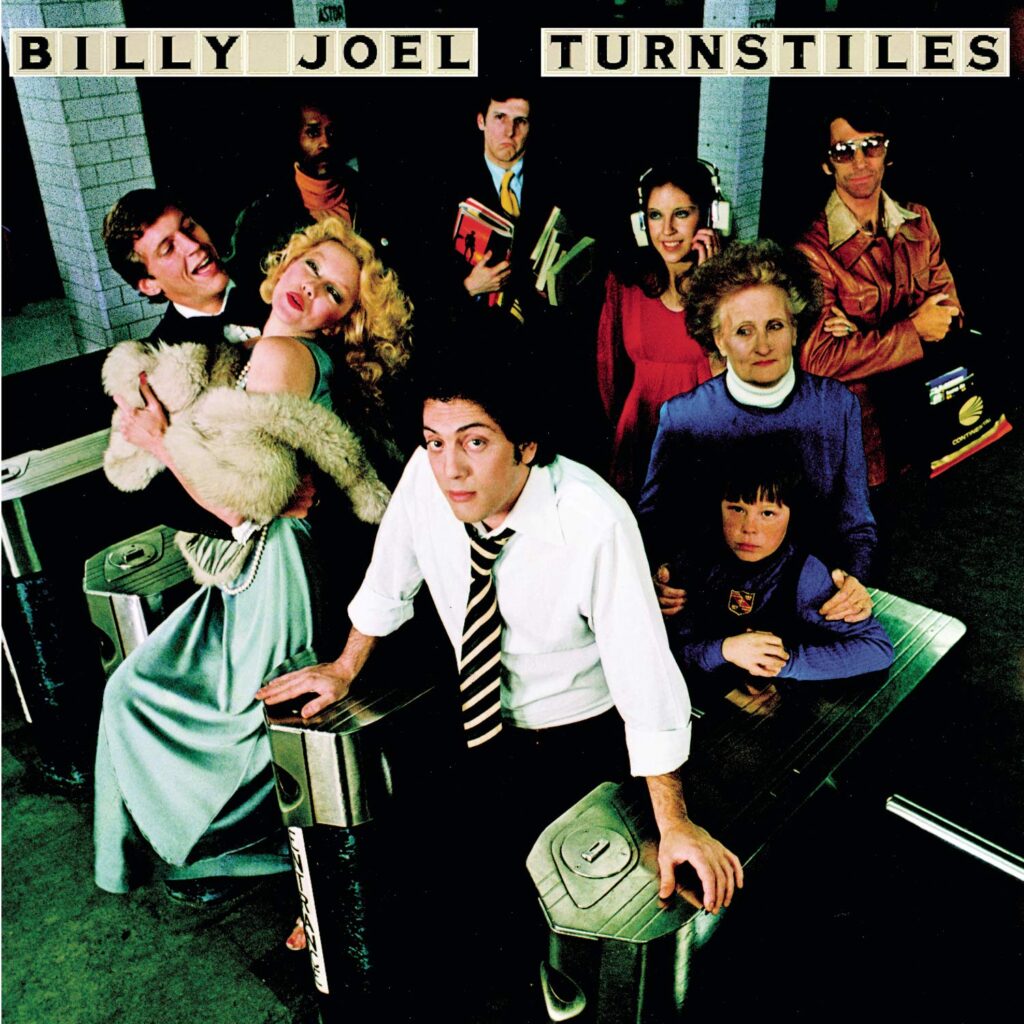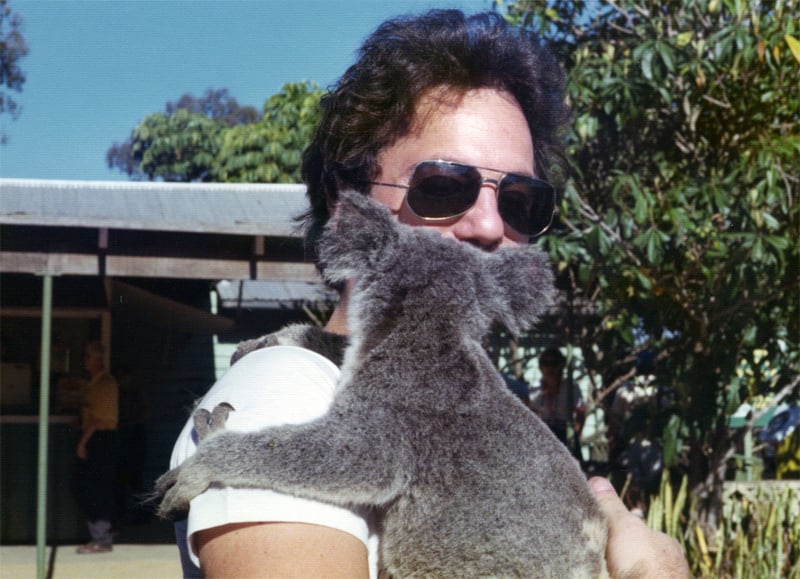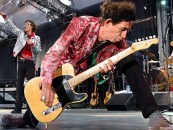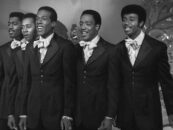Billy Joel: On 1976’s ‘Turnstiles,’ Classic Songs, Unappreciated
by Amy McGrath Billy Joel may be one the best-known piano men that contemporary music has birthed, alongside Elton John. Yet back through the mists of time, Joel was a young scrabbler from Long Island, a high school dropout and burgeoning musician with a number of failed ’60s minor releases who nonetheless broke out with a debut album in 1971, Cold Spring Harbor.
Billy Joel may be one the best-known piano men that contemporary music has birthed, alongside Elton John. Yet back through the mists of time, Joel was a young scrabbler from Long Island, a high school dropout and burgeoning musician with a number of failed ’60s minor releases who nonetheless broke out with a debut album in 1971, Cold Spring Harbor.
Joel would go on to release Piano Man in 1973 and Streetlife Serenade in 1974. Those two albums had seen Joel move to Los Angeles after signing with Columbia Records in 1972 and while Piano Man gave Joel his lifetime signature song, Streetlife Serenade was viewed unfavorably by music critics at the time. Disenfranchised by the lackluster reception, he felt untethered, unsure where he stood in the eyes of the public and the music industry.
Related: Watch Joel perform on The Midnight Special in 1975
Producer Jim Guercio (Blood, Sweat and Tears, Chicago) suggested Joel record at Caribou Ranch in Nederland, Colo., using members of Elton John’s band. Frustrated after two months’ worth of work that netted exactly zero satisfaction, Joel packed it in and traveled back to New York City to re-record the entire 12-track album with himself as a debut producer.
Unlike his past efforts, the May 19, 1976 release of Turnstiles, at a tidy 36 minutes, marked the first time that Joel enlisted his road band for recording sessions. That included Howie Emerson, Russell Javors, James Smith, Doug Stegmeyer and Liberty DeVitto, a team only one like Joel could count on, after spending weeks together onstage, perfecting the chemistry that made the transfer to the studio harmoniously professional.
The album’s first track, “Say Goodbye to Hollywood,” was, as could be deduced, a nostalgic farewell to his West Coast life. But upon closer inspection, it’s really an overt homage to the Ronettes song “Be My Baby,” complete with castanets, echo chamber and the obligatory Phil Spector “Wall of Sound.” Joel has acknowledged he wrote the tune with that mindset, even as the lyrics lay down a vision of a conflicted au revoir.
As bewitching a tune that dances lyrically with “sadness or euphoria,” “Summer, Highland Falls” evokes a period when Joel headed up melodically, yet married his delivery with contradictory observations: Happy or sad? Accept or move on? By the end, the narrator sounds tired and resolved, with no clear conclusion to this relationship that fades out, leaving the listener wanting a more satisfactory ending. Joel’s live performance of this song, as heard on 1981’s Songs in the Attic, is, however, a gutsier, more powerful rendition that gives the tune (and the listener) the recognition it deserves.
Caribbean steel drums are probably not on your card for present-day Joel, but they certainly were for the album’s third track, “All You Wanna Do Is Dance.” A gentler cousin/forerunner to 1980’s “It’s Still Rock and Roll to Me,” the reggae vibes are laced with humor-filled nostalgia (“Why don’t the Beatles get back together?/Why don’t nobody sing of romance?”) in a somewhat cringey pastiche to the genre. Not his best, not his worst. Kind of like Joel’s overall career.
Closing out the album on side one (as only it could) is “New York State of Mind.” With almost 50 years of hindsight, it’s hard to fathom that this was just another song, just another tribute to the Big Apple like so many before and so many after. To the uninitiated, it’s a quiet piece, where Joel casts off for good any trace of the album’s opener and, just because he can, the wasted time spent at Caribou Ranch (“Been high in the Rockies”). Framed with saxophone and strings, it neatly mirrors the prevalent cadence that was NYC hip: jazzy overtones, anthemic glory of the ordinary and appropriate piano flourishes.
The song’s resonance can’t be overstated, taking on its own life, with Barbra Streisand recording her version the very next year for her album Superman. She recorded it again as a duet with Joel in 2014 on Partners, but the most natural and transcendental take was Joel and Tony Bennett’s Grammy-nominated rendition in 2001.
Side two opens with the beautifully constructed “James,” the album’s first single release in July 1976. Joel details a friend’s chosen life path over a burbling Fender Rhodes riff that cascades between melancholy and uncertainty. The subject of the song has been up for debate. However, while noting that several outlets see it as a blend of two old friends from Joel’s past, it’s mostly based on high school bandmate Jim Bosse, who pursued a career in optometry and eventually ended up reworking the song and a few others at Joel’s behest, which yielded a classical guitar covers CD entitled The Billy Joel Collection—Classical Guitar.
Without question, one of Joel’s best-known songs begins with the kind of show-offy intro that spurns heavy imitation—or challenges. “Prelude/Angry Young Man” jumps out with Joel’s rapid-fire staccato piano instrumental (an homage to the Surfaris’ “Wipe Out”) and proceeds to equally trash and sympathize with the designated world of the “angry young man.” Joel, however, did reveal in a 1996 Q&A that the inspiration came from his tour manager, someone who alienated everyone and blamed others with such venom that Joel eventually had to fire him. The man remarked, “Oh, so you’re washing your hands of me?” which got the songwriter thinking, “Wow, if I’m Pontius Pilate, he thinks he’s Jesus Christ. He just wanted to be a martyr.”
The uplifting title of “I’ve Loved These Days” is in stark contrast to the subject matter, illustrating another aspect of Joel’s time on the West Coast. “We’re going wrong/we’re gaining weight/We’re sleeping long/and far too late” trying to keep reality as far away as possible, indulging, as Joel’s biographer Mark Bego noted, in the four “C’s:” champagne, cocaine, cabernet and caviar. Ethereal and wistful with just the right amount of pathos, it’s perhaps one track on Turnstiles that should have gained more appreciation (although it was released as the album’s second single) at its time of release.
The album’s closing track reminds the listener how prophetic a forgotten tune turned out to be. “Miami 2017 (See the Lights Go Out on Broadway)” seemed like a far-off dystopian sci-fi fantasy in 1976. Outer space and an apocalypse didn’t seem to be the proper ending to this album, as Joel namechecks prominent NYC-area locales (Brooklyn, Bronx and Queens) and imagines their destruction in a rollicking tune, “before we all lived here in Florida.” Joel wrote the song while in Los Angeles, seeing New York City try to navigate bankruptcy proceedings as the Federal government denied assistance. The song, however, took on more than he imagined when he played at the Concert for New York City in October 2001. “I wrote that song 25 years ago. I thought it was going to be a science fiction song; I never thought it would really happen. But unlike the end of that song, we ain’t going anywhere!” Joel has played the song at several tribute shows and on New Year’s Eve 2016 as he welcomed in 2017—in Miami.
The front cover photograph by Jerry Abramowitz was shot at the Astor Place subway station at 8th Street and Fourth Avenue in New York City and was in and of itself a visual narrative that reflected the songs within. The over-the-top couple on the left symbolize “I’ve Loved These Days.” The Black gentleman in the back symbolizes “Prelude/Angry Young Man,” the suited man with the books represents “James.” The girl with the headphones on her head symbolizes “All You Wanna Do Is Dance.” The man in the glasses, leather jacket and travel bag symbolizes “Say Goodbye to Hollywood” and the grandmother and boy (who was Joel’s stepson Sean) represent “Miami 2017.”
Turnstiles was not a commercial success, only rising to #122 on Billboard’s album chart, risking an ejection from his Columbia Records contract. But the extensive tour that followed in 1977 saw a culmination, with three sold-out shows at Carnegie Hall in June 1977. Producer Phil Ramone was in attendance and, shortly thereafter, began working with the musician on what would result in Joel’s commercial and critical breakthrough, 1977’s The Stranger.
[Recent vinyl box sets of Joel’s catalog are available here and here.]
Watch Joel perform “New York State of Mind” on England’s Old Grey Whistle Test
Tickets to see Billy Joel in concert are available here and here.







3 Comments so far
Jump into a conversationIt’s interesting that Billy chose to revisit songs from his pre-superstar days for the live album. I think those songs come off better live.
I REALLY enjoy The Billy Joel Channel when it pops up on Sirius/XM.
Agree, as I noted, his re-imaginng for his “Songs in the Attic” release was a real eye-opener.
The “Turnstiles” LP may have “fizzled” by general public and airplay reception, but I personally thought it to be an excellent album then, and still now, and a precursor look into the brilliant follow-up masterpiece “The Stranger”.
Many of the songs from “Turnstiles” are now considered classics, and are regularly included (and expected by his audiences) in Billy Joel’s concert performance repertoire.